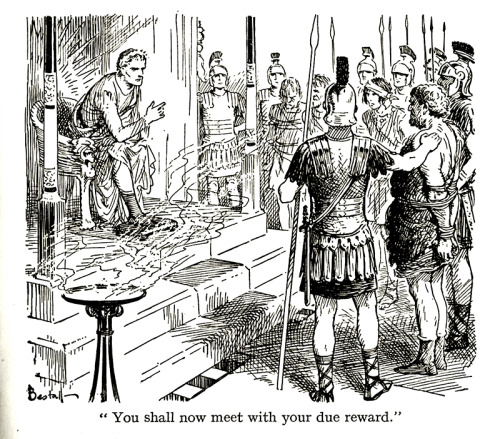peashooter85:Caesar and the Pirates During the 1st century BC piracy was especially problematic in t
peashooter85:Caesar and the Pirates During the 1st century BC piracy was especially problematic in the Mediterranean. In 75 BC a band of Cilician pirates captured a young Roman attorney and magistrate named Julius Caesar. According to Plutarch in the Life of Julius Caesar, he had an interesting way of dealing with his captors,[2.1] First, when the pirates demanded a ransom of twenty talents, Caesar burst out laughing. They did not know, he said, who it was that they had captured, and he volunteered to pay fifty.[2.2] Then, when he had sent his followers to the various cities in order to raise the money and was left with one friend and two servants among these Cilicians, about the most bloodthirsty people in the world, he treated them so highhandedly that, whenever he wanted to sleep, he would send to them and tell them to stop talking.[2.3] For thirty-eight days, with the greatest unconcern, he joined in all their games and exercises, just as if he was their leader instead of their prisoner.[2.4] He also wrote poems and speeches which he read aloud to them, and if they failed to admire his work, he would call them to their faces illiterate savages, and would often laughingly threaten to have them all hanged. They were much taken with this and attributed his freedom of speech to a kind of simplicity in his character or boyish playfulness.[2.5] However, the ransom arrived from Miletus and, as soon as he had paid it and been set free, he immediately manned some ships and set sail from the harbor of Miletus against the pirates. He found them still there, lying at anchor off the island, and he captured nearly all of them.[2.6] He took their property as spoils of war and put the men themselves into the prison at Pergamon. He then went in person to [Marcus] Junius, the governor of Asia, thinking it proper that he, as praetor in charge of the province, should see to the punishment of the prisoners.[2.7] Junius, however, cast longing eyes at the money, which came to a considerable sum, and kept saying that he needed time to look into the case.Caesar paid no further attention to him. He went to Pergamon, took the pirates out of prison and crucified the lot of them, just as he had often told them he would do when he was on the island and they imagined that he was joking.http://www.livius.org/sources/content/plutarch/plutarchs-caesar/caesar-and-the-pirates/ -- source link
Tumblr Blog : peashooter85.tumblr.com

